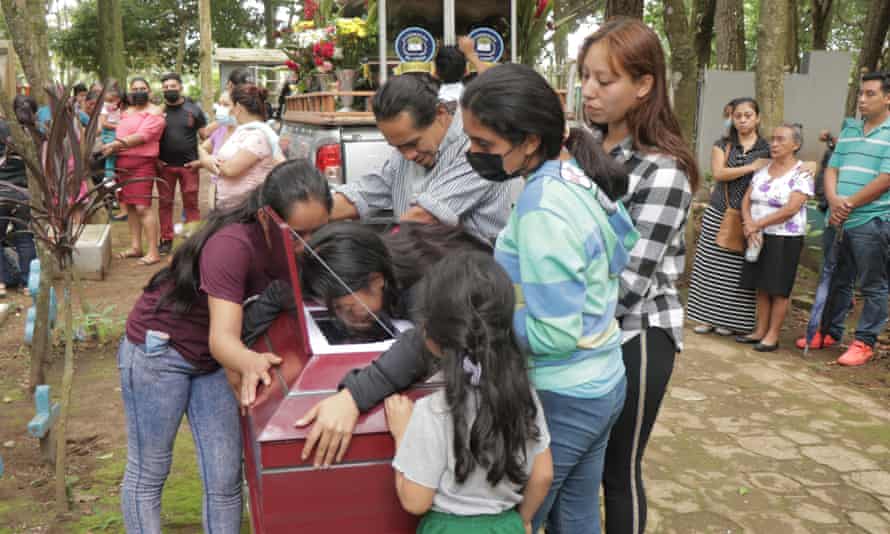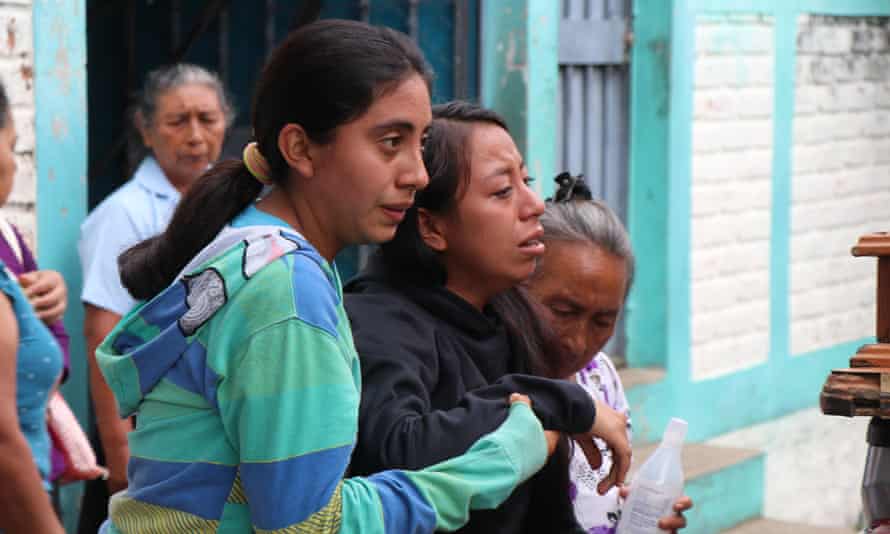[ad_1]
Only a few weeks ago, Sandra García was looking forward to the brighter future Nayib Bukele promised El Salvador’s opportunity-starved youth when he swept to power three years ago.
“I gave him my vote believing we’d have a better life,” said the 23-year-old, one of hundreds of thousands of young Salvadorans who chose the authoritarian-minded millennial as their president.
Those dreams imploded when the man she planned to marry, Juan José Ibáñez García, was seized during of one of the most ferocious security crackdowns in recent Latin American history.
Two days later Ibáñez – who friends and family say worked in a local pizzeria and had no links to crime – was moved to a maximum-security penitentiary housing many of the 38,000-plus people the government claims to have imprisoned since the offensive began in late March. A fortnight later the 21-year-old was dead – one of at least 35 prisoners who have reportedly died in mysterious circumstances since Bukele declared a draconian state of exception supposedly designed to annihilate his country’s gangs.
An undertaker appeared at García’s door in Salcoatitán, a bucolic tourist town in El Salvador’s coffee growing heartlands, early one morning to break the news. “My world came crashing down,” she said later, as she stood by a coffin containing her lover’s remains.

Bukele declared his “war on gangs” on Sunday 27 March after an explosion of bloodshed shocking even for a country that until recently was considered the most violent on Earth. El Salvador’s murder rate has plummeted since the populist took power in 2019 – allegedly thanks to a secret pact with leaders of the Mara Salvatrucha gang. But on the eve of the crackdown – in a wave of attacks seemingly calculated to puncture one of Bukele’s key claims to success – 62 people were murdered in a single day.
“That Saturday was just horrifying … I told my kids not to go out because things were really messy,” said Jorge Beltrán, a crime reporter who has covered the gangs for more than two decades. “Once, on the most terrible day, there were something like 50 [murders]. But 60-something? This had never happened before.”
One body was dumped at the entrance to Bukele’s pet project: a resort town nicknamed Surf City with which the former advertising executive hopes to boost the economy and rebrand El Salvador as a tropical paradise for sunseekers and cryptocurrency fans.
“It was a huge blow to the president’s public image – and image is so important to him, that he needed to come up with something that had never been done before,” said Tiziano Breda, a Central America analyst from Crisis Group.
Bukele’s “something” was a state of exception that was immediately approved by the parliament his party overwhelmingly controls.
The results have been jaw-dropping, with more people arrested during the last two months than in the whole of last year – most of them young and underprivileged men and women whose names and photographs are splashed across state media each day. “It is really, really stunning,” said Breda. “This is an all-out, nationwide operation to capture anyone who may have or has had any relationship to gangs.”
The spectre of Bukele’s security offensive is hard to escape in Central America’s smallest country.
Billboards urge citizens to denounce on potential “terrorists” on a telephone hotline. Radio stations churn out government propaganda in which authorities vow to fight to the end: “We will not stop until we have wiped out the gangs.”
A poster outside one major prison, La Esperanza, shows a security agent towering over semi-naked suspects with a truncheon. “Want to be next? You decide!” it reads.
Many of El Salvador’s 6 million citizens are delighted at the assault on US-born gangs, which have wreaked havoc since taking root here after the 12-year civil war ended in 1992. “He’s been rounding up all these scoundrels … we feel so much safer,” said Sandra López, 61, a supporter who attended a recent pro-Bukele demo in downtown San Salvador. Polls show Bukele has become even more popular since the state of exception started, with approval ratings of more than 90%.
But the crackdown has been a nightmare for the hundreds of women who have been sleeping rough outside La Esperanza, desperately seeking information about loved ones arrested on vague charges.
Many of those women voted Bukele in 2019, but after weeks camping on filthy pavements are having second thoughts.
“This isn’t a war on gangs, it’s a war on the people,” seethed one woman from the city of Santa Ana who was looking for her brother and asked not to be named.
Further up the street sat a woman in even greater distress. Mari Hernández said her partner, Saul Gómez, had worked at a sugar-grinding plant until police arrested him at their home in late April.
“They said it was an order from the president that people should be brought in whether or not they were criminals … and that if they didn’t detain him they’d be arrested themselves for not following the law,” claimed the pregnant 24-year-old.
The officers told Hernández her 25-year-old partner would soon be free – but five weeks later he remained behind bars while she was two weeks away from giving birth.
To make matters worse, doctors had detected a murmur on the baby’s heart during a prenatal checkup. Before the arrest, Hernández had been undergoing treatment, but without Gómez’s income she could no longer afford to pay for it.
“The reality is that in El Salvador it is now a crime to be young. You’re not safe anywhere,” said Hernández.
Beltrán, the crime reporter, said it was obvious that many prisoners genuinely had no gang ties and were apprehended “simply because the police didn’t like the look of them” or perhaps had a brush with the law years earlier.
A former soldier, Beltrán said he supported a surgical offensive against the murderous criminal groups. “But they haven’t done this. They’re just taking people indiscriminately,” he added. “And like in every war, it’s always the poor who suffer.”
The Bukele administration and its cheerleaders defend what they call a long-needed assault on dangerous “terrorists”, although the president and his security minister declined to be interviewed.
“This is a war between upstanding Salvadorans and the criminals who for years have condemned us to a life of anxiety, mourning and misery,” Bukele said last week in an address marking his three years in office. “We have God and the people of El Salvador on our side.”
The tourism minister, Morena Valdez, celebrated the crackdown during a visit to Surf City, where an international surfing competition was taking place. “For the tourist sector it has been a boom,” Valdez said.
Yet critics see the state of exception as the latest phase in El Salvador’s march towards tyranny under a messianic leader who has already amassed huge power and sarcastically calls himself “the world’s coolest dictator”.
“I see this as one more step towards the construction of an authoritarian state in which power is concentrated around one person and one family – it’s very similar to what’s happening in Nicaragua,” said Jimmy Alvarado, an investigative journalist from El Faro, the combative news outlet that revealed the government’s secret pact with the gangs.
Johnny Wright Sol, one of the few opposition politicians in parliament, said: “History tells us that many of these populist governments end as authoritarian experiments and [what’s striking] is the speed at which [this is happening]. It took [Daniel] Ortega many more years in Nicaragua than it has taken Bukele.”
Wright feared the gang crackdown could trigger a human catastrophe, bringing further violence and disease to overcrowded jails and plunging poor families further into penury. “This could rapidly spiral into a very severe humanitarian crisis,” he said.
For Sandra García, the crisis has already arrived.
She suffered a miscarriage, and told the police officer who took her partner who replied: “We don’t care – we have a quota of arrests we need to reach.”
Two weeks later, Ibáñez was taken from prison to a hospital for reasons that remain unclear. He died there the early hours of 25 May. “Nobody has told me anything, nobody has explained to me why,” García said.
Hours after identifying his body, García stood beside his coffin in Juayúa, the town where Ibáñez was born, and pondered her loss. “We had so many dreams … to be parents; to build a business together; to study together … and it’s all gone. It all ended with his death,” she said. “So many Salvadorans put our trust in [Bukele] – and we were cheated.”

The next day mourners processed through the town centre to a red and white church where a priest read from the Book of John, urging shell-shocked mourners to transform their sadness into joy. “You shall weep and lament, but the world shall rejoice.”
There was resignation and bitterness at the tranquil forested cemetery, where García passed out as the casket with Ibáñez’s remains was lowered into the earth.
Stunned mothers – several with sons languishing in jail – muttered words of indignation at what they called Bukele’s war on El Salvador’s youth.
“It is evil,” smoldered one woman, lamenting how so many ordinary Salvadorans still supported their populist leader because of the $300 (£27.35) benefit he gave them during the coronavirus pandemic.
The woman balked at the idea that Ibáñez had died of natural causes yet saw no chance of ever discovering the truth. “God will see that there is justice,” she said as mourners began to disperse, heading back to startled communities where the young now fear to leave their homes.
[ad_2]




